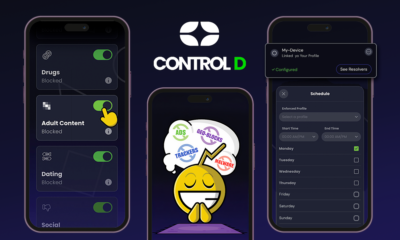TECHNOLOGY
NetApp’s Cloud Complexity Report highlights shifting demands of multicloud

NetApp, a cloud-led, data-centric software company, has released the 2023 Cloud Complexity Report, a global survey exploring how technology decision makers are navigating cloud requirements coming from digital transformation and AI initiatives and the complexity of multicloud environments.
The report found that 98% of senior IT leaders have been impacted by increasing cloud complexity in some capacity, potentially leading to poor IT performance, loss in revenue and barriers to business growth.
Ronen Schwartz, senior VP and GM, Cloud Storage, NetApp, said: “Our global research report highlights paradigm shifts in how technology leaders look at and manage their cloud initiatives.
“As cloud adoption accelerates and businesses innovate faster to compete, technology leaders are facing growing pressure to juggle multiple priorities at once – causing many to rethink how they manage efficiency and security in this new environment.”
Gabie Boko, CMO, NetApp, said: “Our global survey data demonstrates the extreme complexity of modern IT environments, and the pressure technology executives are under to show measurable outcomes from cloud investments.
“At NetApp, we’ve simplified the complex through our approach, which enables technology executives to increase the speed of innovation, lower costs and improve consistency, flexibility and agility across on-premises and cloud environments.”
Key findings from the report include:
Cloud Complexity Reaches a Tipping Point
Data complexity has reached a boiling point for companies globally, and tech executives are feeling the pressure to contain its impact on the business. However, technical and organizational challenges may stunt their cloud strategies, with 88% citing working across cloud environments as a barrier, while 32% struggle just to align on a clear vision at the leadership level.
Global Context: The following regions list this as their top concern if data complexity is not managed:
- Cybersecurity: France, Spain, and Australia/New Zealand
- Leadership skepticism: France, Spain, Japan
- Inefficient use across the organization: Australia/New Zealand
- Lack of visibility: Japan
Leadership Want Cloud Results Now
Sustainability has become an unexpected cloud-driver, with nearly eight in ten tech executives citing ESG outcomes as critical to their cloud strategy. However, return on investment (ROI) is a concern among leadership, with 84% of tech executives saying their cloud strategy is already expected to show results across the organization.
Global Context:
- Nearly half of tech executives (49%) report that when cloud strategy discussions happen, cost concerns come up often or all the time.
- Data regulation and compliance is another cloud driver, with various local regulations promoting their multicloud strategy most or some of the time.
Tech Executives Consider AI as a Possible Solution
In the next year, over a third (37%) of tech executives report that half or more of their cloud deployments will be supported by AI-driven applications. Nearly half of tech executives at smaller companies – those with fewer than 250 employees – expect to reach the 50% mark in the next year, and 63% by 2030, while larger companies lag.
Global Context:
- The U.S. leads EMEA and APAC on plans to deploy AI-driven cloud applications in the next year, with France and Japan as outliers in their regions.
- Scaling AI is the top priority in EMEA and APAC, but is second in the U.S., behind meeting regulatory compliance.
Randy Kerns, senior strategist & analyst at the Evaluator Group, said: “NetApp’s global research report reveals a disconnect between the executives outside of IT and those within – specifically, leaders working to execute on cloud are the ones most ingrained in the cost and complexity issues while those outside of IT have yet to fully understand.
“In the process of shifting to the cloud, leaders are experiencing challenges, leaving room for vendors to address these current or yet-to-be discovered issues. As customers express concerns with cloud implementation, vendors have the opportunity to build and offer solutions to simplify the process.”
As organizations increasingly move to multi-cloud environments, NetApp aims to alleviate efficiency bottlenecks by allowing IT leaders to manage their systems on one, streamlined user interface. By taking an evolved cloud approach, NetApp is leading the charge for next generation cloud management and storage – equipping teams with the tools necessary to stay abreast of the key trends outlined in the research report above (e.g., optimising costs, assessing risks, and operating sustainably).
NetApp partnered with Wakefield Research to conduct a quantitative research study during November 2022, among 1,300 tech and data executives at businesses in nine markets: US, EMEA (France, Germany, Spain, the UK), and APAC (India, Japan, Singapore, and Australia/New Zealand). At the time of completion, all participants held positions that were classified as “director-level and above” and worked across IT, IT infrastructure, cloud infrastructure and data engineering departments.
Want to learn more about cybersecurity and the cloud from industry leaders? Check out Cyber Security & Cloud Expo taking place in Amsterdam, California, and London. Explore other upcoming enterprise technology events and webinars powered by TechForge here.
TECHNOLOGY
Next-gen chips, Amazon Q, and speedy S3

AWS re:Invent, which has been taking place from November 27 and runs to December 1, has had its usual plethora of announcements: a total of 21 at time of print.
Perhaps not surprisingly, given the huge potential impact of generative AI – ChatGPT officially turns one year old today – a lot of focus has been on the AI side for AWS’ announcements, including a major partnership inked with NVIDIA across infrastructure, software, and services.
Yet there has been plenty more announced at the Las Vegas jamboree besides. Here, CloudTech rounds up the best of the rest:
Next-generation chips
This was the other major AI-focused announcement at re:Invent: the launch of two new chips, AWS Graviton4 and AWS Trainium2, for training and running AI and machine learning (ML) models, among other customer workloads. Graviton4 shapes up against its predecessor with 30% better compute performance, 50% more cores and 75% more memory bandwidth, while Trainium2 delivers up to four times faster training than before and will be able to be deployed in EC2 UltraClusters of up to 100,000 chips.
The EC2 UltraClusters are designed to ‘deliver the highest performance, most energy efficient AI model training infrastructure in the cloud’, as AWS puts it. With it, customers will be able to train large language models in ‘a fraction of the time’, as well as double energy efficiency.
As ever, AWS offers customers who are already utilising these tools. Databricks, Epic and SAP are among the companies cited as using the new AWS-designed chips.
Zero-ETL integrations
AWS announced new Amazon Aurora PostgreSQL, Amazon DynamoDB, and Amazon Relational Database Services (Amazon RDS) for MySQL integrations with Amazon Redshift, AWS’ cloud data warehouse. The zero-ETL integrations – eliminating the need to build ETL (extract, transform, load) data pipelines – make it easier to connect and analyse transactional data across various relational and non-relational databases in Amazon Redshift.
A simple example of how zero-ETL functions can be seen is in a hypothetical company which stores transactional data – time of transaction, items bought, where the transaction occurred – in a relational database, but use another analytics tool to analyse data in a non-relational database. To connect it all up, companies would previously have to construct ETL data pipelines which are a time and money sink.
The latest integrations “build on AWS’s zero-ETL foundation… so customers can quickly and easily connect all of their data, no matter where it lives,” the company said.
Amazon S3 Express One Zone
AWS announced the general availability of Amazon S3 Express One Zone, a new storage class purpose-built for customers’ most frequently-accessed data. Data access speed is up to 10 times faster and request costs up to 50% lower than standard S3. Companies can also opt to collocate their Amazon S3 Express One Zone data in the same availability zone as their compute resources.
Companies and partners who are using Amazon S3 Express One Zone include ChaosSearch, Cloudera, and Pinterest.
Amazon Q
A new product, and an interesting pivot, again with generative AI at its core. Amazon Q was announced as a ‘new type of generative AI-powered assistant’ which can be tailored to a customer’s business. “Customers can get fast, relevant answers to pressing questions, generate content, and take actions – all informed by a customer’s information repositories, code, and enterprise systems,” AWS added. The service also can assist companies building on AWS, as well as companies using AWS applications for business intelligence, contact centres, and supply chain management.
Customers cited as early adopters include Accenture, BMW and Wunderkind.
Want to learn more about cybersecurity and the cloud from industry leaders? Check out Cyber Security & Cloud Expo taking place in Amsterdam, California, and London. Explore other upcoming enterprise technology events and webinars powered by TechForge here.
TECHNOLOGY
HCLTech and Cisco create collaborative hybrid workplaces

Digital comms specialist Cisco and global tech firm HCLTech have teamed up to launch Meeting-Rooms-as-a-Service (MRaaS).
Available on a subscription model, this solution modernises legacy meeting rooms and enables users to join meetings from any meeting solution provider using Webex devices.
The MRaaS solution helps enterprises simplify the design, implementation and maintenance of integrated meeting rooms, enabling seamless collaboration for their globally distributed hybrid workforces.
Rakshit Ghura, senior VP and Global head of digital workplace services, HCLTech, said: “MRaaS combines our consulting and managed services expertise with Cisco’s proficiency in Webex devices to change the way employees conceptualise, organise and interact in a collaborative environment for a modern hybrid work model.
“The common vision of our partnership is to elevate the collaboration experience at work and drive productivity through modern meeting rooms.”
Alexandra Zagury, VP of partner managed and as-a-Service Sales at Cisco, said: “Our partnership with HCLTech helps our clients transform their offices through cost-effective managed services that support the ongoing evolution of workspaces.
“As we reimagine the modern office, we are making it easier to support collaboration and productivity among workers, whether they are in the office or elsewhere.”
Cisco’s Webex collaboration devices harness the power of artificial intelligence to offer intuitive, seamless collaboration experiences, enabling meeting rooms with smart features such as meeting zones, intelligent people framing, optimised attendee audio and background noise removal, among others.
Want to learn more about cybersecurity and the cloud from industry leaders? Check out Cyber Security & Cloud Expo taking place in Amsterdam, California, and London. Explore other upcoming enterprise technology events and webinars powered by TechForge here.
TECHNOLOGY
Canonical releases low-touch private cloud MicroCloud

Canonical has announced the general availability of MicroCloud, a low-touch, open source cloud solution. MicroCloud is part of Canonical’s growing cloud infrastructure portfolio.
It is purpose-built for scalable clusters and edge deployments for all types of enterprises. It is designed with simplicity, security and automation in mind, minimising the time and effort to both deploy and maintain it. Conveniently, enterprise support for MicroCloud is offered as part of Canonical’s Ubuntu Pro subscription, with several support tiers available, and priced per node.
MicroClouds are optimised for repeatable and reliable remote deployments. A single command initiates the orchestration and clustering of various components with minimal involvement by the user, resulting in a fully functional cloud within minutes. This simplified deployment process significantly reduces the barrier to entry, putting a production-grade cloud at everyone’s fingertips.
Juan Manuel Ventura, head of architectures & technologies at Spindox, said: “Cloud computing is not only about technology, it’s the beating heart of any modern industrial transformation, driving agility and innovation. Our mission is to provide our customers with the most effective ways to innovate and bring value; having a complexity-free cloud infrastructure is one important piece of that puzzle. With MicroCloud, the focus shifts away from struggling with cloud operations to solving real business challenges” says
In addition to seamless deployment, MicroCloud prioritises security and ease of maintenance. All MicroCloud components are built with strict confinement for increased security, with over-the-air transactional updates that preserve data and roll back on errors automatically. Upgrades to newer versions are handled automatically and without downtime, with the mechanisms to hold or schedule them as needed.
With this approach, MicroCloud caters to both on-premise clouds but also edge deployments at remote locations, allowing organisations to use the same infrastructure primitives and services wherever they are needed. It is suitable for business-in-branch office locations or industrial use inside a factory, as well as distributed locations where the focus is on replicability and unattended operations.
Cedric Gegout, VP of product at Canonical, said: “As data becomes more distributed, the infrastructure has to follow. Cloud computing is now distributed, spanning across data centres, far and near edge computing appliances. MicroCloud is our answer to that.
“By packaging known infrastructure primitives in a portable and unattended way, we are delivering a simpler, more prescriptive cloud experience that makes zero-ops a reality for many Industries.“
MicroCloud’s lightweight architecture makes it usable on both commodity and high-end hardware, with several ways to further reduce its footprint depending on your workload needs. In addition to the standard Ubuntu Server or Desktop, MicroClouds can be run on Ubuntu Core – a lightweight OS optimised for the edge. With Ubuntu Core, MicroClouds are a perfect solution for far-edge locations with limited computing capabilities. Users can choose to run their workloads using Kubernetes or via system containers. System containers based on LXD behave similarly to traditional VMs but consume fewer resources while providing bare-metal performance.
Coupled with Canonical’s Ubuntu Pro + Support subscription, MicroCloud users can benefit from an enterprise-grade open source cloud solution that is fully supported and with better economics. An Ubuntu Pro subscription offers security maintenance for the broadest collection of open-source software available from a single vendor today. It covers over 30k packages with a consistent security maintenance commitment, and additional features such as kernel livepatch, systems management at scale, certified compliance and hardening profiles enabling easy adoption for enterprises. With per-node pricing and no hidden fees, customers can rest assured that their environment is secure and supported without the expensive price tag typically associated with cloud solutions.
Want to learn more about cybersecurity and the cloud from industry leaders? Check out Cyber Security & Cloud Expo taking place in Amsterdam, California, and London. Explore other upcoming enterprise technology events and webinars powered by TechForge here.
-

 PPC5 days ago
PPC5 days ago19 Best SEO Tools in 2024 (For Every Use Case)
-

 MARKETING7 days ago
MARKETING7 days agoStreamlining Processes for Increased Efficiency and Results
-
SEARCHENGINES6 days ago
Daily Search Forum Recap: April 17, 2024
-

 PPC7 days ago
PPC7 days ago97 Marvelous May Content Ideas for Blog Posts, Videos, & More
-

 SEO7 days ago
SEO7 days agoAn In-Depth Guide And Best Practices For Mobile SEO
-
SEARCHENGINES5 days ago
Daily Search Forum Recap: April 18, 2024
-

 MARKETING6 days ago
MARKETING6 days agoEcommerce evolution: Blurring the lines between B2B and B2C
-
SEARCHENGINES4 days ago
Daily Search Forum Recap: April 19, 2024














